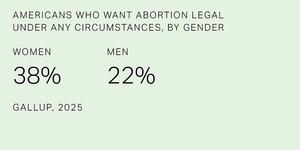WASHINGTON, D.C. — Thirty percent of Americans believe abortion should be legal “under any circumstances,” compared with 13% saying it should be illegal in all circumstances, as of May 2025. The majority of Americans, 55%, say it depends on the circumstances. At the same time, the public leans more toward viewing abortion as morally acceptable (49%) than morally wrong (40%) and toward self-identifying as pro-choice (51%) than pro-life (43%).
Circumstances Affect Americans’ View of Abortion
According to Gallup's May 2025 update on Americans' abortion views, 30% believe abortion should be legal “under any circumstances,” 55% say it should be legal “under certain circumstances,” and 13% say it should be illegal “in all circumstances.” A follow-up question asked of those taking the middle position finds 19% want abortion to be legal under most circumstances, while 35% favor it in only a few circumstances.
The demographic breakdown of these abortion views can be found on Gallup’s Legality of Abortion Demographic Tables page.
Slim Majority Identify as ‘Pro-Choice’
For the fourth consecutive year, a majority of Americans (51%) identify as “pro-choice,” while 43% say they are pro-life. Between 2007 and 2021, no more than 50% of Americans identified as “pro-choice.”
The gender gap in pro-choice identity is at a historic high of 20 points, with 61% of women identifying as pro-choice, compared with 41% of men. The breakdown of how different subgroups of Americans answer this question is available on Gallup’s “Pro-Choice” or “Pro-Life” Demographic Table page.
A similar gender gap is seen in perceptions of abortion’s morality, with 57% of women vs. 40% of men considering it to be morally acceptable. Overall, 49% of Americans say abortion is morally acceptable, while 40% say it is morally wrong. This is a departure from most years before 2021, when the larger share of Americans viewed abortion as morally wrong.
U.S. subgroups’ views on this question are provided on Gallup’s Morality of Abortion Demographic Table page.
Yearly trends for Americans’ views on the legality of abortion and whether they identify as pro-choice or pro-life are shown by gender, age and party ID on the following pages:
Americans Oppose Overturning Roe
Gallup most recently asked Americans about their views on overturning Roe v. Wade in May 2024. At that time, 60% of Americans said overturning Roe v. Wade was a “bad thing,” while 36% called it a “good thing.” These views were similar to what Gallup measured in 2022, shortly after a draft of the Dobbs decision that overturned Roe was leaked, and in 2023. Additionally, Gallup’s 2024 update found that 61% of Americans favor allowing the abortion pill mifepristone to be available in the U.S. as a prescription drug, whereas 32% oppose this.
Support for Abortion Rights Varies by Trimester
In May 2023, Gallup studied public opinion about the legality of abortion at different stages of pregnancy. At that time, about two-thirds of Americans said abortion should be legal in the first trimester (69%), while support dropped to 37% for the second trimester and 22% for the third. Majorities opposed abortion being legal in the second (55%) and third (70%) trimesters.
In line with Americans’ broad support for first-trimester abortions, the majority (59%) opposed laws that “ban abortions after a fetal heartbeat can be detected, usually around the sixth week of pregnancy.”
Find more Gallup articles about abortion on the Abortion Topics page.
Explore Gallup questions and trends about abortion on Gallup's Topics A-Z: Abortion page.
For more articles in the "Short Answer" series, visit Gallup's The Short Answer page.
Stay up to date with the latest insights by following @Gallup on X and on Instagram.
Learn more about how the Gallup Poll Social Series works.




